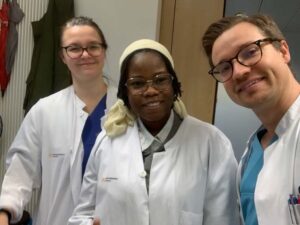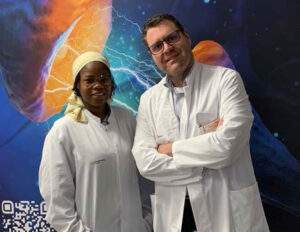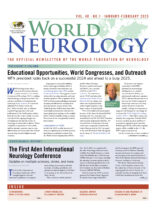Report of a department visit to Dusseldorf, Germany.
By Aïssata S. Touré

Dr. Aïssata S. Touré visits with staff members at the University Hospital of Dusseldorf.
I had the opportunity to visit the University Hospital of Dusseldorf Nov. 11-Dec. 5, 2024, thanks to a training grant provided by the German Neurological Society and the World Federation of Neurology (WFN).
This was a unique training opportunity, which allowed me to experience the neurology field in a high-level setting with well-trained physicians. I have seen several patients with different neurologists, allowing me to learn from different views and angles.
Over a period of one month, I saw approximately 50 patients presenting with different neurological conditions including dystonia, encephalitis, epilepsy, meningitis, migraine, multiple sclerosis, myasthenia, myelitis, Parkinson’s disease, and stroke.
 I attended a botulinum toxin injection session, and I saw the apomorphine pump — a second line treatment for Parkinson’s disease management — for the first time.
I attended a botulinum toxin injection session, and I saw the apomorphine pump — a second line treatment for Parkinson’s disease management — for the first time.
This training allowed me to enhance my clinical approach and management skills in terms of epilepsy, neurovascular diseases, and movement disorders.
During my stay in Dusseldorf, I attended sessions featuring electroencephalograms, nerve conduction studies and transcranial doppler (TCD) ultrasound for patients suffering from atherosclerosis, epilepsy, and neuropathy. These sessions allowed me to recognize the basic patterns of those conditions.
I also spent time in the laboratory and participated in activities, such as functional studies using cell and animal models.

Dr. Aïssata S. Touré (second from right) enjoys some time outside of the hospital in Dusseldorf during her visit.
After returning home, I will apply what I have learned in my daily activities. I would like to continue working to establish a strong collaboration involving my mentors and the neurology team in Dusseldorf.
I will use the acquired knowledge by regularly giving talks and participating in the training process of medical students. I will assist my young fellow residents who want to apply to the WFN Department Visit program to help increase their chances of being selected among their peers. I will inform and encourage those who are not aware of the program to apply.
My main interests are in the clinical and genetic features of inherited neurological conditions, including familial epilepsy, neuromuscular disorders, and movement disorders. Those conditions are not rare in Mali due to a high rate of consanguineous and intraethnic marriage. Mali also has a high birth rate, which creates a unique opportunity to conduct genetic and genomic studies, unlike developed countries.
I will continue to seek expertise from the neurology team in Dusseldorf for atypical cases. •
Dr. Aïssata S. Touré is a resident in clinical neurology and research assistant in neurogenetics from Bamako, Mali.
